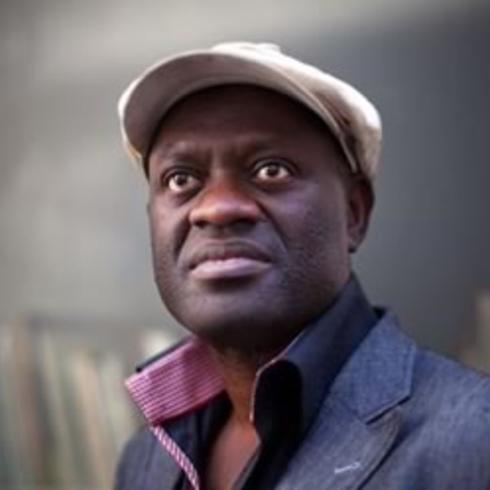
" Lumières de Pointe Noire "
- Winner : The Literary Prize 2013
Born in Congo - Brazzaville in 1966, Alain Mabanckou devoted himself to writing after having studied law in Paris. He now lives in California and teaches french literature at the University of Los Angeles since 2007.
The first novel by Alain Mabanckou, Bleu-Blanc-Rouge, published in 1998, earned him the Grand Prix Littèraire of black Africa. This "book full of humor, which, never the less, portrays the sad fate of many African immigrants in Paris" (presentation by the editor), inaugurated the work of Mabanckou who regularly continues to publish mainly novels, but also essays and compilations of poetry.
The essays he published offer a look from Africa to Europe but also on racialism (Lettre à Jimmy, 2007) and are tinged with a style that gives these autobiographical texts authenticity and a particular sensibility.
The four books of poetry published by Alain Mabanckou between 1995 and 2001 were assembled into one book in 2007 entitled Tant que les arbres s'enracineront dans la terre.
But it is especially by his novels that Alain Mabanckou is revealed to the public.
Unanimously acclaimed by the press and readers, Verre cassé was published in 2005. The author of Verre cassé imposes a powerful prosody, with no embellishments or small talk. It is an oratory discussion on a very classical scale where humor, poetry, and alcoholic distress form a beautiful combination." (Jean-Maurice de Montrémy, Livres Hebdo, December 2005)
In 2006, Alain Mabanckou published Mémoires d'un porc-èpic, a novel for which he won the Prix Renaudot. "We love this book right from its dedication: To my mother, Pauline Kengué, who told me this story (give or take a few lies). The sensitivity in it already touches you. Malice and distance too. Alain Mabanckou works like the fable writers and storytellers. A tribute to speech that delivers from the fear of death, written in one breath, without a single full stop, these Mémoires d'un porc-épic are a real delight." (Michel Abescat, Télérama, October 2006)
With Black Bazar, published in 2009, "we relish in this popular language that Mabanckou kneads, electrifies, colors without concern for political correctness. We laugh at this festival of clichés, on all these given ideas about Blacks, more or less dark, about Whites, more or less fair, and women more or less callipygian. A supreme courtesy of the author because, treating colonization or Africa, this book is much more serious than it seems. As explained by the narrator, franco-congolese like the author, there is joy in grief, it's like that in my small country ..." (Michel Abescat, Télérama, February 2009)
In 2010, in Demain j'aurais vingt ans, "he puts himself into the skin of Michel, a ten year old boy living in the 1970s in Congo at the time of decolonization. This narrative with a candid tone about a child overwhelmed by the challenges of adults is a real success. Through this child, and always with humor, Mabanckou explains what few essays have succeeded in doing. This is the first time in many years that we see how a small african boy perceived the world. Rarely have we read about history - the history of France and its international whirlpool - told in this way, at this angle. What do we learn in the end? The brainwashing that many young african children were subject to, bathed in the teaching of communism. You must read the scenes where the best student in the class recites by heart the speech of the dictator." (Mohammed Aïssaoui, Le Figaro, August 24th, 2010)
In 2012, Alain Mabanckou published Le sanglot de l'homme noir. "Nourished by his own experience from Africa where he was born, France where he studied and America where he teaches french literature, this opus illuminates the most contentious issues." (Valerie Marin La Meslée, Le Point, February 2nd, 2012)
Twenty-three years after leaving his native Congo, Alain Mabanckou returns to the scene of his childhood and delivers a story through the eyes of an adult and a writer in Lumières de Pointe Noire (2013). "At the centre of the book there is the mother. A graceful silhouette with sad eyes. She bathes the entire text, returning again and again in melancholic and gentle waves. Phantom memories of the woman who the author did not see neither age nor die, the presence of this woman, Pauline Kengué, a modest peasant native of Louboulou haunts the story of a return home after twenty-three years absence. The gaze scrutinizes space and time in a cinematographic manner - each chapter refers to the title of a film, passing with the same brio from colour to sepia, from the lightest to the most serious. At the end of the journey the conclusion is clear : this country that lives within him is no longer his, but the author remains faithful, as shown in this text, to his mother's last wish, on that day in 1989 when they both knew that they were seeing each other for the last time : hot water never forgets that it was once cold". (Michel Abescat, Télérama, January 5th 2013)

